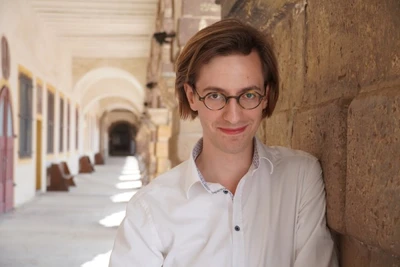Doctoral Candidate (Gotha Research Centre)
Office hours
nach Vereinbarung
Visiting address
Forschungszentrum Gotha der Universität Erfurt (FZG)
Schloßberg 2
99867 Gotha
Mailing address
Forschungszentrum Gotha der Universität Erfurt (FZG)
Schloßberg 2
99867 Gotha
Research Employee (Gotha Research Library)
Office hours
nach Vereinbarung
Visiting address
Universität Erfurt
CG 1 - Forschungsbibliothek Gotha
Schloss Friedenstein
Schlossplatz 1
99867 Gotha
Mailing address
Universität Erfurt
CG1 - Forschungsbibliothek Gotha
Schloss Friedenstein
Schlossplatz 1
99867 Gotha

Curriculum Vitae
since January 2024
Research employee in the project „Erschließung der Korrespondenz und Lebenszeugnisse Veit Ludwig von Seckendorffs“
(Universität Erfurt – Forschungsbibliothek Gotha)
since April 2021
Member of the Gotha Research Centre
since April 2019
Doctoral student at the University of Erfurt - Gotha Research Centre in the graduate centre "History of Knowledge in the Modern Era"; supervisor: Prof. Martin Mulsow
Christian Martin Wieland Scholarship of the University of Erfurt
2018-2019
Student at the Christian-Albrechts-Universität zu Kiel: MA studies in History and Philosophy
2016 - 2018
Student at the University of Erfurt: MA studies in history
2014 - 2016
Student assistant at the professorship of Ancient History (Prof. Veit Rosenberger †) at the University of Erfurt
2013-2016
Student at the University of Erfurt: BA studies in History (major) and Catholic Religion (minor)
1994
Born in Aschaffenburg (Bavaria)
Research Interests
Research Project
Emergence, Preservation and Transmission of Ceremonial Knowledge in the 18th Century Using the Example of the Gotha Court
Contemporary historians see the social interaction and counteraction of the 17th and 18th centuries as being decisively shaped by a great consciousness of rank in all social strata. The knowledge of one's own rank demanded its defense both against attacks from above and against ambitions from below. The frequently associated attempts to raise one's own status, if necessary, were the source of constant political, legal and social conflicts. In the controversial questions, for example, about the order in which documents were sealed, about the carriage parking spaces in the imperial Hofburg, or about the introduction of the office of chamberlain at imperial courts, the rank accorded to oneself and to others found its outward expression. Based on precedents, negotiations, and provocative pretensions, political and court ceremonial reflected the hierarchy in the Holy Roman Empire.
The research project examines the emergence, preservation and transmission of knowledge about ceremonial as a form of communication in the 18th century using the example of the Gotha ducal court. In this context, the extensive correspondence of the Gotha dukes with other ecclesiastical and secular princes of the empire plays just as important a role as the court's internal documentation of individual ceremonial events. In addition to the files of the Privy Council and the High Court Marshal's Office, including the well-known Fourier books, the holdings of ceremonial publications in the ducal libraries, the individual court orders and the private notes of the dukes also bear witness to the omnipresence of ceremonial knowledge at court. A high value was attached to the conscious outward communication of one's own status within the political and social structure of Europe. In order to live up to this claim, those in charge had to be well informed at all times and have large stores of ceremonial knowledge at their disposal.
How this politically vital knowledge about the numerous and interrelated questions of rank came into being, was preserved, and passed on will now be examined. The central question here is not so much what the ceremonies themselves looked like as acts, but rather what was considered worthy of being handed down and why, and what use was made of these traditions.
Publications
Articles
Die Entstehung der ersten Gothaer Fourierbücher zwischen Hofökonomie und Zeremoniell (1694–1699), in: Zeitschrift für Thüringische Geschichte 76 (2022), pp. 73-101.
„in Versammlung des ganzen Hofes“. Beobachtungen zur Beteiligung Bürgerlicher an Festen des Gothaer Herzogshofes im 17. und 18. Jahrhundert, in: Fürstliche Feste. Höfische Festkultur zwischen Zeremoniell und Amüsement, Petersberg 2020, pp. 209-223 (= Jahrbuch der Stiftung Thüringer Schlösser und Gärten, vol. 23).
Online publications
Vereinigt durch die Krise? Unerwartete Begegnungen mit den Korrespondierenden Fürsten, in: Forschen in Gotha. Ein Blog Gothaer Forschungseinrichtungen, 14. Mai. 2020.
https://www.gotha3.de/forschungsblog/archives/4665.
Reviews
Elisabeth Ruffert: Das Gesandtschaftszeremoniell des brandenburgisch-preußischen Hofes um 1700. Berlin 2022, in: HSozKult, 19.10.2022.
https://www.hsozkult.de/searching/id/reb-129282?title=e-ruffert-das-gesandtschaftszeremoniell-des-brandenburgisch-preussischen-hofes-um-1700&recno=1&q=ruffert&sort=&fq=&total=8
Thomas Dorfner, Thomas Kirchner, Christine Roll (eds.): Berichten als kommunikative Herausforderung. Europäische Gesandtenberichte der Frühen Neuzeit in praxeologischer Perspektive. Köln 2021, in: HSozKult 10.05.2022.
https://www.hsozkult.de/publicationreview/id/reb-114285?title=t-dorfner-u-a-hrsg-berichten-als-kommunikative-herausforderung
Conference reports
Report on the workshop ‘Vom Erkunden zur Erkenntnis? Ansätze und Perspektiven digitaler Sammlungsvisualisierungen‘, in: Blog der Forschungsbibliothek Gotha, 13 December 2023.
https://blog-fbg.uni-erfurt.de/2023/12/bericht-zum-workshop-am-10-11-2023/.
Workshop ‘Digitales Storytelling in der (sammlungsbezogenen) Wissenschaftskommunikation‘, in: Blog der Forschungsbibliothek Gotha, 20 October 2021.
https://blog-fbg.uni-erfurt.de/2021/10/bericht-ueber-den-workshop-digitales-storytelling-in-der-sammlungsbezogenen-wissenschaftskommunikation/.
Gefährliche Freundschaften. Wissenschaftliches Kolloquium für Martin Mulsow zum 60. Geburtstag. 1.11.2019 bis 2.11.2019 in Gotha, in: H-Soz-u-Kult, 21 November 2019.
https://www.hsozkult.de/searching/id/tagungsberichte-8530?title=gefaehrliche-freundschaften-wissenschaftliches-kolloquium-fuer-martin-mulsow-zum-60-geburtstag&q=gef%C3%A4hrliche%20freundschaften&sort=&fq=&total=7&recno=2&subType=fdkn.

